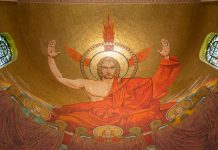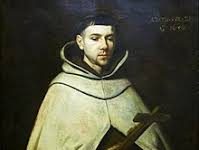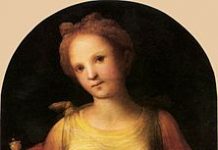Recently I felt really blessed going back to the catechesis Pope Benedict XVI gave on St Bernard of Clairvaux on Wednesday 21 October 2009. His first statement of that instructive and inspiring catechesis ran the following: Today I would like to talk about St Bernard of Clairvaux, called “the last of the Fathers” of the Church because once again in the 12th century he renewed and brought to the fore the important theology of the Fathers.
Hence, St Bernard is the last Father of the Church simply because of his leadership in the Church, most particularly in defending, expounding, and developing the Catholic doctrine. Besides the fact that for the first four centuries the Fathers of the Church were mainly bishops in the centuries to come we find more and more priests and deacons who can be considered as an extension of this Patristic era. Moreover, Mother Church rightly demands four main characteristics to be shown in both their personal life as well as the works they did produce to be recognized as Church Fathers. These are antiquity, which means that the person involved lived before the eighth century, doctrinal orthodoxy, personal holiness and the universal approval of the Church.
In view of all this we can all the more appreciate why St Bernard of Claivaux can be considered as “the last of the Fathers”, a title which some give him. Pope Benedict XVI succinctly and profoundly explained why we can rightly call St Bernard the last of the Fathers in his general audience of 2009:
St Bernard, on the other hand, solidly founded on the Bible and on the Fathers of the Church, reminds us that without a profound faith in God, nourished by prayer and contemplation, by an intimate relationship with the Lord, our reflections on the divine mysteries risk becoming an empty intellectual exercise and losing their credibility. Theology refers us back to the “knowledge of the Saints,” to their intuition of the mysteries of the living God and to their wisdom, a gift of the Holy Spirit, which become a reference point for theological thought. Together with Bernard of Clairvaux, we too must recognize that man seeks God better and finds him more easily “in prayer than in discussion.”
Supported by such a strong and persuasive claim of Benedict XVI on St Bernard let us delve deeper into some of the life-giving reflections this great saint and reformer who scattered the Cistercian Order practically in all of Europe, presents to us in order to receive that life which Christ brought us, a life in abundance (see John 10:10).
St Bernard teaches us that through knowledge is always geared towards love. He said: There are those who seek knowledge for the sake of knowledge; that is Curiosity. There are those who seek knowledge to be known by others; that is Vanity. There are those who seek knowledge in order to serve; that is Love. From such a great piece of wisdom you and I can easily scale the depths of our motivation for knowledge by asking ourselves: Do I seek knowledge for the sake of increasing and glorifying my egoistic tendencies or I seek knowledge in order that I let the Holy Spirit show me ways to love more authentically?
Bernard was such a ‘real, concrete’ person. He tells us: The road to hell is paved with good intentions. We are not saying that good intentions are not important but also, as St Thomas Aquinas would later explain with much further detail, it is important that we have the right means to arrive at the good end. Hence: What counts for me in life, only the good intention and that’s it? Do I also ask the Holy Spirit to show me the way to arrive at that good intention lest the way should mislead me?
Moreover, the Doctor Mellifluus, or the “Honey-Sweet” or “Honey-tongued” Doctor, gives us the fantastic insight that what we love we shall grow to resemble. The caution is obvious: let us love the right person to resemble. Do I love Jesus Christ, the Holy One of God, in order to resemble him? Or do I resemble other persons and things besides Jesus Christ?
For St Bernard the spiritual journey is one of constant struggle. Having said that the one who wants to actually resemble his Master is the one who keeps following him even when, as human, he would fall into sin. He said: A saint is not someone who never sins, but one who sins less and less frequently and gets up more and more quickly. And what about my personal journey to Jesus? Do I keep following him, even when I fall? Or do I get easily discouraged and remain in sin?
The great Bernard recognized the importance of having a sacred space to let the Holy Scriptures and theology get us closer to Jesus and his saving message. From his wonderful experience of contemplation Bernard could easily attribute the importance of nature as it were the sanctuary for the contemplation of God in his Son Jesus, Our dearest Brother, Man-God. He said: What I know of the divine sciences and the Holy Scriptures, I have learned in woods and fields. I have no other masters than the beeches and the oaks. Do I go into the woods to contemplate God’s love for me in Jesus Christ?
In his mystical teaching, Bernard highly responds to our existential queries most notably when we are confronted with pain and suffering. He said: God is incapable of suffering but capable of sharing another’s suffering. To a person who is suffering or even when I myself am suffering, do I remind myself that God is sharing my suffering? What does this reality make me feel? Does it open for me a ray of hope in my suffering? Can I be a humble servant to others in helping them grow in the realization that God is sharing with their suffering?
Bernard has much to teach us when we feel the existential emptiness of our world who keeps rejecting the love of Jesus for it. He helps us realize that Jesus is the real sweetness we all need to aid us taste life as a real gift and a loving mystery to be lived and never a problem to be solved. In his writings St Bernard addresses Jesus in the subsequent terms: Jesus the very thought of Thee with sweetness fills my breast; but sweeter far Thy face to see, and in Thy presence rest. On this matter Bernard also adds this important suggestion which you and me can easily live and share with others: Rest is in Him alone. Man knows no peace in the world; but he has no disturbance when he is with God. When I feel lonely do I rest in Jesus? When I encounter other people who are suffering from existential loneliness do I invite them to talk to Jesus, listen to Jesus, mention the Name of Jesus?
Bernard presents us with the sole reason for loving God. He tells us squarely: The reason for loving God is God Himself. As to how He is to be loved, there is only one measure: It is immeasurable! Do I love God with generosity or do I measure my love to God? What does this dictum say to me: The measure of love is love without measure? Am I applying it in my love towards God?
St Bernard was truly contemplative because his life witness and teaching were so down-to-earth. This can be easily seen when he talked about self-knowledge. He said: If you lack self-knowledge you will possess neither the fear of God nor humility. In simple terms, Bernard is telling you and me that if we really want to live our human and spiritual dimension in life we have to know our limits. Adding to this one can notice this thought being fully developed in the following reflection on Jesus’ humanity: The lesser he has made himself in his humanity, the greater has he shown himself in kindness. The more he humbles himself on my account, the more powerfully he engages my love.
Acknowledging what is God’s and what we can do and not do is a remarkable way of being healed from the most abhorrent sin of pride and arrogance. Do I fear God? Do I know my strengths and weaknesses? Do I rely on God, who became like, a human being in Jesus Christ, to help me grow?
Another title I would love to add to St Bernard of Clairvaux is that He is a Doctor Cor Jesu, the Doctor of Jesus’ heart. With that simplicity, clarity, profundity and love he beautifully explains the healing power of Jesus’ Most Sacred Heart. He writes: So let me ask you: Are there moments when you place yourself quietly in the Lord’s presence, when you calmly spend time with him, when you bask in his gaze? Do you let his fire inflame your heart? Unless you let him warm you more and more with his love and tenderness, you will not catch fire. How will you then be able to set the hearts of others on fire by your words and witness? If, gazing on the face of Christ, you feel unable to let yourself be healed and transformed, then enter into the Lord’s heart, into his wounds, for that is the abode of divine mercy. Am I devoted to the Divine Mercy of Jesus? Do I pray the Chaplet of the Divine Mercy? Do I do acts of mercy to serve Jesus himself in the poor?
Let us pray with St Bernard and make our own this act of spiritual communion he lovingly wrote and prayed to Jesus, his Beloved Master, Saviour, Lord and God:
As I cannot this day enjoy the happiness of assisting at the Holy Mysteries, O my God, I transport myself in spirit at the foot of Your altar. I unite with the Church which by the hands of the Priest, offers You Your adorable Son in the Holy Sacrifice. I offer myself with Him, by Him and in His Name. I adore, I praise and thank You, imploring your mercy, invoking your assistance and presenting You the homage I owe You as my Creator, the love due to You as my Saviour.
Apply to my soul, I beseech You, O Merciful Jesus, Your infinite merits; apply them also to those for whom I particularly wish to pray. I desire to communicate spiritually, that Your Blood may purify, Your Flesh strengthen, and Your Spirit sanctify me. May I never forget that You, my divine Redeemer, died for me; may I die to all that is not You, that hereafter I may live eternally with You. Amen.










